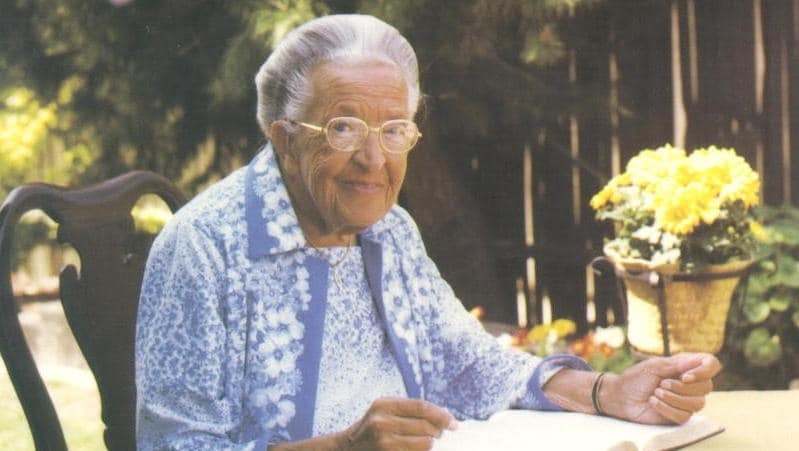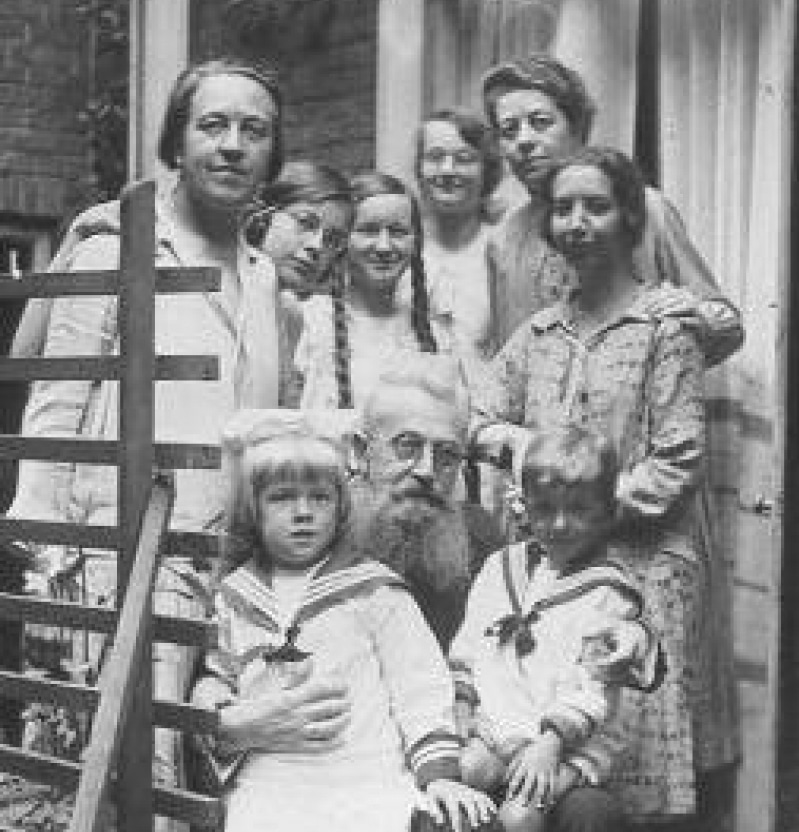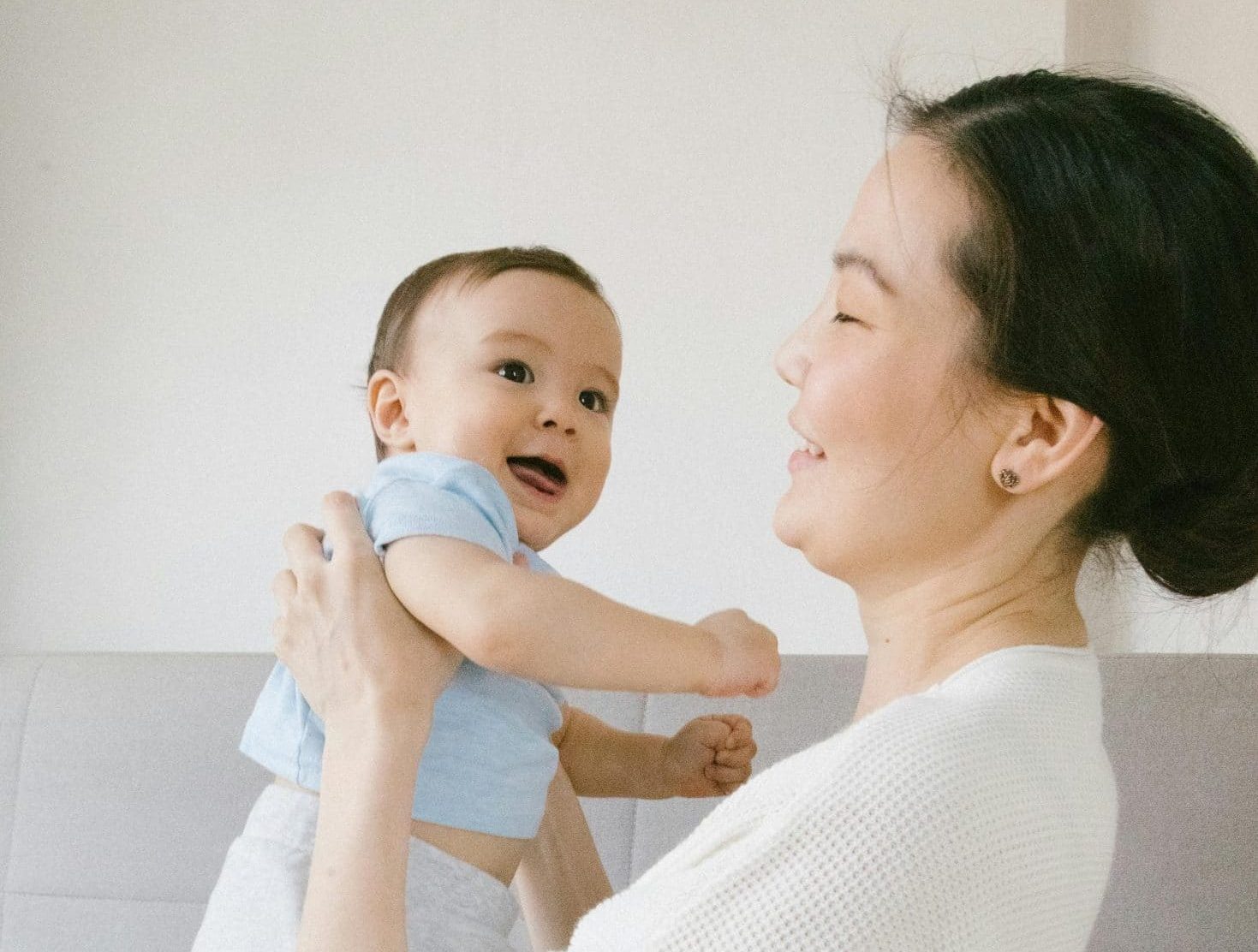“In darkness, God’s truth shines most clear”: War hero Corrie Ten Boom, who suffered torture and loss for hiding Jews from Nazis
Mary Cotes via Graceworks // June 10, 2023, 1:12 pm

As Corrie ten Boom prayed in her prison cell, she wondered: "If the Gospels were truly the pattern of God's activity, then defeat was only the beginning. I would look around at the bare little cell and wonder what conceivable victory could come from a place like this.” All photos via tenboom.org.
Amongst the Christian women of recent times who have remained true to the Kingdom despite being confronted with the very worst of human sinfulness, it is hard to find a more moving testimony than that of Corrie ten Boom and her sister Betsie during World War II. These two women experienced the power of Christ’s resurrection in a place of death.
Brought up in a large house in Haarlem, Holland, with a door as wide open as the hearts of the family who lived there, the two sisters had no idea of what the future might bring.

Corrie ten Boom and her family in Haarlem.
From a Dutch reformed family, Corrie and Betsie lived with their father, a widowed watchmaker whose shop was on the ground floor of the house at street level. He would welcome with open arms everyone who arrived at their door asking for help.
The ten Booms always managed to find an extra spoonful in the saucepan.
A dangerous double life
During the Second World War, the Nazi occupation brought hardships for all, but it was exceptionally terrible for Jewish members of the population.
“Lord Jesus, I offer myself for Your people. In any way. Any place. Any time.”
A prayer was rising inside Corrie’s heart: “Lord Jesus, I offer myself for Your people. In any way. Any place. Any time.”
This extraordinarily courageous prayer was to be answered when, one night in 1942, there was a knock at the door. A Jewish woman with a suitcase stood on the doorstep and simply said that she had been told that the ten Booms would be able to help her.
Staying as true to the family’s reputation for welcome as to the values of the Kingdom, the family invited her in. Two nights later, an elderly couple arrived with the same story.
Very quickly the ten Boom household became a refuge – a “hiding place” – for Jews and others in need.
While the political situation grew horrifically worse around them, the life of the Kingdom continued to be celebrated in their home.

The extended ten Boom extended family with some of their house guests. Four members of the family, including Corrie’s father and sister, Betsie, died in prison after being arrested by the Gestapo, the Nazi secret police.
Corrie had to learn to live a double life very speedily.
Corrie assisted her father in his watch workshop and used her professional life as a cover for her clandestine activity.
On the one hand, she needed to appear to be a model citizen in the eyes of the Nazi authorities.
On the other hand, she was called to be a model citizen in the eyes of God, hiding Jews in danger, finding them safe places to move on to, and providing them with false papers necessary for both food and escape.
The first Dutch woman to qualify as a watchmaker, Corrie assisted her father in the workshop and used her professional life as a cover for her clandestine activity.
If someone from the resistance rang to ask her to repair a lady’s watch she understood that there was a Jewish woman who needed a hiding place. A request in relation to a very old gentleman’s watch let her know that it was an elderly Jewish man who needed refuge.
The ten Booms had a small hiding place constructed in their house.

The false wall in Corrie ten Boom’s room in the Ten Boom Museum allows visitors to see inside the hiding place which the family used to hide Jews on the run. Photo via tenboom.org.
It was at the back of a bedroom on the top floor, as far as possible from the front door, to allow the maximum amount of time for residents to reach it if ever there was a raid.
Mounting risks
A growing number of townspeople seemed to be aware of what was going on under their roof. One day their young apprentice was arrested by the Gestapo while he was on his way to warn one of the houses in the network that a search was coming.
“Perhaps only when human effort had done its best and failed, would God’s power alone be free to work.”
Corrie wrote later: “Once again we considered stopping the work. Once again we discovered we could not. That night Father and Betsie and I prayed long after the others had gone to bed. We knew that in spite of daily mounting risks we had no choice but to move forward. This was evil’s hour: We could not run away from it. Perhaps only when human effort had done its best and failed, would God’s power alone be free to work.”
Corrie’s fears proved to be justified shortly afterwards, when the Gestapo raided the house.
Those who were hiding were not found, but Corrie, Betsie and their father were arrested. They were taken to the Gestapo headquarters in Holland. Seeing an old man standing in front of him, the officer-in-charge of the questioning wanted to send Corrie’s father back home.
However, at the risk of his life, Corrie’s father remained true to the Kingdom. “If I go home today,” he said evenly and clearly, “tomorrow I will open my door again to any man in need who knocks.”
These words led to his imprisonment, and Corrie and Betsie never saw their father again. Elderly and fragile, he died several days later.
“Defeat was only the beginning”
Corrie and her sister were also to become witnesses of Christ’s resurrection life right inside a place of death: A Nazi concentration camp. The two sisters were first taken to Scheveningen prison, in Holland. There, Corrie spent four months in quarantine, recovering from illness.
“I would look around at the bare little cell and wonder what conceivable victory could come from a place like this.”
Imprisoned in darkness in a minute cell, she had time to reflect and pray. She was convinced that the Gospels offered a pattern for the action of God. As she re-read the Gospel stories, Corrie began to understand more of the great purposes of God:
“Was it possible that this – all of this that seemed so wasteful and so needless – this war, Scheveningen prison, this very cell, none of it was unforeseen or accidental?
“But … if the Gospels were truly the pattern of God’s activity, then defeat was only the beginning. I would look around at the bare little cell and wonder what conceivable victory could come from a place like this.”
At Scheveningen, Corrie was reunited with her sister and, together, they were taken to Ravensbrück: The principal Nazi concentration camp for women in Germany. In the course of the war, 50,000 women died there. Betsie was one of them.
Some died of un-treated illness, others of starvation, exhaustion or despair. Some were shot, or tortured then hanged or transferred to the gas chambers at Auschwitz. Others were subjected to medical experiments or amputations, which killed them or left them handicapped.
Thankful for fleas
In Ravensbrück, the sisters were surrounded with fear and despair. Hatred and death were everywhere. But even as Betsie grew physically weaker every day, the yeast of the Kingdom was still powerfully at work in her.
During the day, they survived in inhuman conditions, and at night they prayed with the women who wanted to join them.
How should they live in such a place? Betsie received the answer to her immense question in the words of Scripture: “Comfort the frightened, help the weak, be patient with everyone. See that none of you repays evil for evil, but always seek to do good to one another and to all.”
During the day, they survived in inhuman conditions, and at night they prayed with the women who wanted to join them. There were more and more of them, of different nationalities and from different Christian traditions.
It became their place of worship and, thanks to the fleas that infested the place, the guards never crossed the threshold. Worship could continue uninterrupted.
“Life in Ravensbrück took place on two separate levels, mutually impossible. One, the observable, external life, grew every day more horrible. The other, the life we lived with God, grew daily better, truth upon truth, glory upon glory.”
Praying for the Nazi guards
Betsie was convinced that the promise of the Kingdom extended to all people, including those living in the thrall of Nazi ideology. During times of prayer with Corrie, Betsie insisted that they pray, too, for the guards.
They needed to intercede for the healing of Germany as much as for the rest of Europe. As they prayed, the two women started to reflect on what they would do in years to come when the war was over. They dreamed of opening a large house where those wounded by life in the concentration camps could come and mend.
They needed to intercede for the healing of Germany as much as for the rest of Europe.
Then a short while before her death, Betsie shared with Corrie the vision she had received: That of creating a camp for healing in a former concentration camp. Those whose lives had been poisoned by an evil ideology based on hatred and violence would be welcomed and have an opportunity to learn the ways of love.
After the war, Corrie exercised an important international ministry in which the vision that Betsie had shared before her death became a reality.
Corrie created a centre in a large house in Bloemendaal in the Netherlands and transformed a former concentration camp into a place of welcome.
Invited throughout the world to speak of her experiences of Ravensbrück, Corrie shared her testimony and that of her sister.
One Sunday, at the end of a service in a church in Munich at which she had been speaking, she recognised someone.
This man had been a guard at Ravensbrück, and had been in charge of the bathroom. He had treated Betsie with untold cruelty when she was ill and frail. Corrie describes how setting eyes on this man brought everything back to her: The pile of clothes that the women had been ordered to take off, the room full of soldiers mocking the women’s nudity and her sister’s frail condition.
“Jesus, I cannot forgive him. Give me Your forgiveness.”
This man came up to Corrie and thanked her profusely for the message she had shared with the congregation, which had reminded him of God’s forgiveness for his sins.
Corrie tells how the man wanted to shake her hand, but that she remained frozen and unable to move. However, beneath her anger, she nonetheless knew that Jesus Christ has died for this man too.
She attempted to extend her hand, but was unable to do so. At that point she prayed: “Jesus, I cannot forgive him. Give me Your forgiveness.”
She tried to extend her hand again,
“As I took his hand, the most incredible thing happened. From my shoulder along my arm and through my hand, a current seemed to pass from me to hip, while into my heart sprang a love for this stranger that almost overwhelmed me.
“And so I discovered that it is not on our forgiveness any more than on our goodness that the world’s healing depends, but on His.
The above excerpt is taken from Women Without Walls: How God shapes ordinary women for extraordinary Kingdom work, written by Mary Cotes and published by Graceworks. The book can be purchased via their online shop.
We are an independent, non-profit organisation that relies on the generosity of our readers, such as yourself, to continue serving the kingdom. Every dollar donated goes directly back into our editorial coverage.
Would you consider partnering with us in our kingdom work by supporting us financially, either as a one-off donation, or a recurring pledge?
Support Salt&Light




